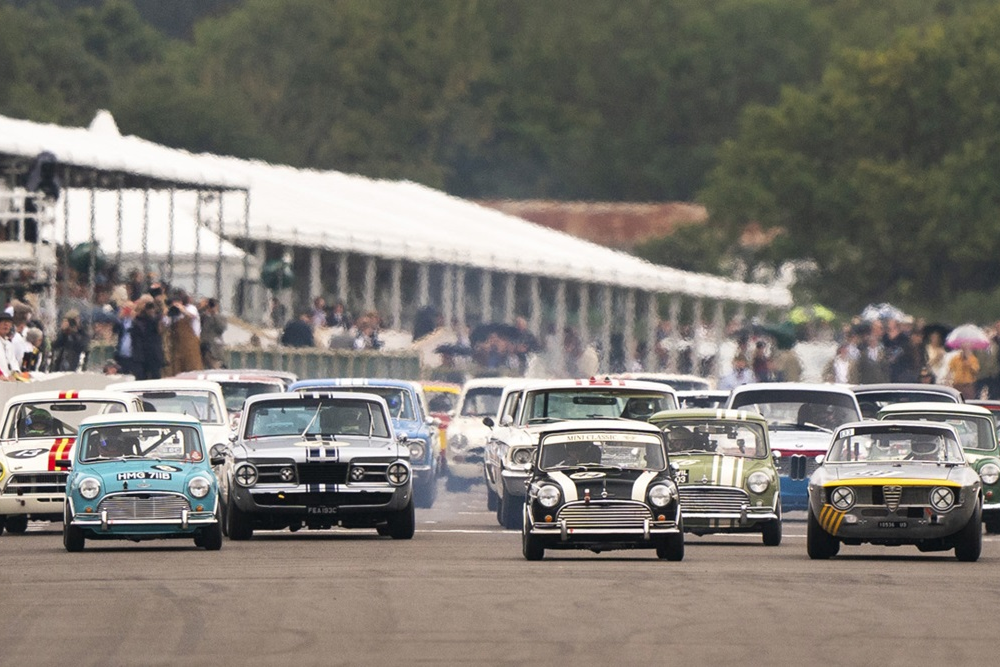The future of the Goodwood Revival was secured in 2024 thanks to the initiative to run all racing on sustainable fuels. It was a huge moment for historic motorsport, and motorsport in general, as Goodwood proved for the first time that large-scale adoption of these new fuels was not only possible, but a means to long-term success.

Goodwood’s journey to a more sustainable future began a year earlier at the 2023 Revival, when the Fordwater Trophy became the first race to be held here powered exclusively by sustainable fuels. That was followed in April at the 81st Members’ Meeting presented by Audrain Motorsport, where the Ken Miles Cup presented by LGT Management featured a grid of sustainably-fuelled Ford Mustangs.
We got exclusive access to some engine testing in the build up to the event, and got to see firsthand how the small-block Ford V8s were being put through their paces on the new fuel. The dyno testing we saw showed that the results were indistinguishable from standard fuel when it came to engine performance. Power and wear rates were all unchanged, outcomes that gave preparers, drivers and Goodwood’s event organisers the confidence to continue towards a fully sustainably-fuelled Revival.
Support from the likes of Sebastian Vettel only boosted the cause. The four-time Formula 1 world champion said that it was great to have the “opportunity to show that sustainable fuels are a fantastic way to ensure a possible future pathway for the sport that we love. It’s great that Goodwood is leading the way in promoting the use of sustainable fuels at historic racing events.”

Such a big step into the relative unknown was always bound to be under the spotlight, with every car failure heavily scrutinised, but over the course of the weekend the response from everybody, even those who had their doubts about transferring to a new type of fuel, was that this was the right decision.
“Honestly, we weren’t sure how the sustainable fuel was going to go in this engine,” said Kyle Tilley who was running a Gilby Type B in the Glover Trophy. “But to be fair we’ve had zero issues. We ran them back-to-back on the dyno with conventional 110 leaded octane racing fuel and [there was] no difference.
“The car runs great. I will admit I was slightly sceptical to start with, but I can’t argue with it, performance has been great and if we’re doing our part to prolong historic racing for many years to come, then I’m all for it.”
Ultimately, the 2024 Revival was a huge learning opportunity for us all, and with some bold decision making Goodwood has paved the way for the rest of the historic motorsport world to follow. Even with such a vast variety of cars in action, the versatility of these sustainable fuels was proven over three days of relentless track action.

Myles Poulton, who was running a Lola T70 Spyder, said: “You’ve got to do a little bit of prep and change the carb setting slightly; the ethanol in the sustainable fuel can cause damage to some of the pipe work, but you’ve just got to be careful with it.
“Besides that, the car ran great. As I said, we had a minor component failure which is unfortunate, but besides that the car was going like a train. No issues at all.”
Spending time with these owners and preparers, we really got a sense of their enthusiasm for these new fuels. It was a weekend that will help to secure the future of their historic racing pursuits for years to come, and we certainly detected a twinkle in the eye of Paul Griffin, owner of the ex-Stirling Moss Cooper T51 that raced in the Richmond & Gordon Trophies, when we spoke to him during the Revival.
“I think it’s vitally important,” he said. “To me, it’s not only a good idea but actually an idea worthy of much greater concentration.”
“We’re changing the whole planet with copper cables and electric cars, whereas in fact changing the form of fuel into the internal combustion engine arguably is a better way to do it. The answer to net-zero is probably a mixture of everything we can think of and some we don’t yet know either.”

“For Goodwood to take the initiative of sustainable fuel for the whole event has been really important. It’s only three or four years ago a lot of people would say ‘oh it’s a dirty old car’. No, it’s not. It’s an old car, but it’s still got life in it yet.”
As for driving in a car powered by sustainable fuel? “I wouldn’t have known the difference,” he added, with a wink. “It would’ve been nice if it had gone a bit faster.”
Goodwood is now truly at the forefront of this push towards sustainability, as it provides a substantial testing ground for historic motorsport to experiment with and improve the implementation of sustainable fuels.
Two-time Formula E champion, Jean-Eric Vergne, who has become one of the most influential drivers within the sustainable motorsport landscape, was driving a Sunbeam in the RAC TT Celebration, and he was certain that the global adoption of sustainable fuels was a necessary and hugely advantageous step.
“I think it’s the future,” he said, when we spoke to him during the 2024 Revival. “It will allow us to keep driving with combustion engines. It’s good that we’re all pushing towards the decarbonisation of global emission through motorsport. At the end of the day, [motorsport is] the laboratory of new technology and historic racing can also be, I find it amazing.”

“I don’t know what the car landscape is going to look like in 15-20 years. Is it going to be fully electric? Is it going to be fully hydrogen? Is it going to be fully sustainable fuel? I don’t know. In aviation it’s quite clear that it’s going to be sustainable fuel, it may also be the same in cars, but electric technology has great advantages and I think it’s good that different areas in the world of cars are pushing different technologies to find out what’s really the best one.
“And maybe for certain types of things electric technology will be the best, sometimes in other areas sustainable fuel or hydrogen will be the best choice. It’s not going to be black and white; the world will be made up of different technologies that will be appropriate for certain environments.”
For those of us who love to experience these brilliant historic cars, with the brutal sounds of combustion engines assaulting our senses, this new era of sustainability is the moment we’ve all been waiting for.
And the 2024 Revival was just the beginning for Goodwood, with the 82nd Members’ Meeting now confirmed to also be running exclusively on sustainable fuels on 12th-13th April. Historic motorsport has never been in better health.
Report by Simon Ostler
find more news here.










